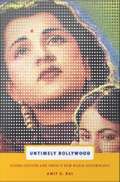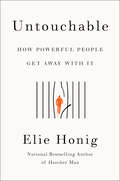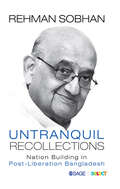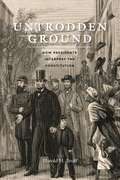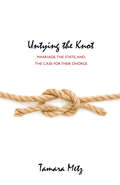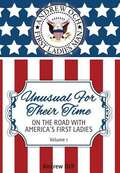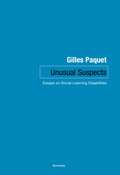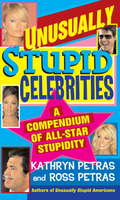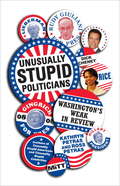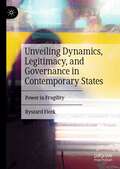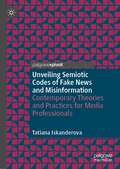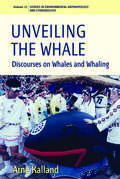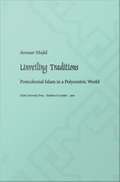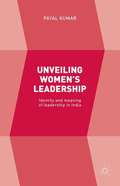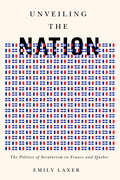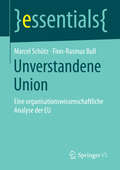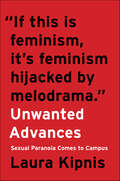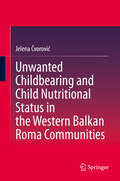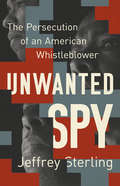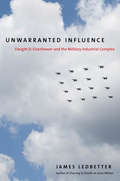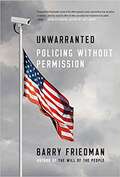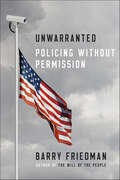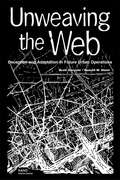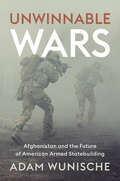- Table View
- List View
Untimely Bollywood: Globalization and India's New Media Assemblage
by Amit S. RaiKnown for its elaborate spectacle of music, dance, costumes, and fantastical story lines, Bollywood cinema is a genre that foregrounds narrative rupture, indeterminacy, and bodily sensation. In Untimely Bollywood, Amit S. Rai argues that the fast-paced, multivalent qualities of contemporary Bollywood cinema are emblematic of the changing conditions of media consumption in a globalizing India. Through analyses of contemporary media practices, Rai shifts the emphasis from a representational and linear understanding of the effects of audiovisual media to the multiple, contradictory, and evolving aspects of media events. He uses the Deleuzian concept of assemblage as a model for understanding the complex clustering of technological, historical, and physical processes that give rise to contemporary media practices. Exploring the ramifications of globalized media, he sheds light on how cinema and other popular media organize bodies, populations, and spaces in order to manage the risky excesses of power and sensation and to reinforce a liberalized postcolonial economy. Rai recounts his experience of attending the first showing of a Bollywood film in a single-screen theater in Bhopal: the sensory experience of the exhibition space, the sound system, the visual style of the film, the crush of the crowd. From that event, he elicits an understanding of cinema as a historically contingent experience of pleasure, a place where the boundaries of identity and social spaces are dissolved and redrawn. He considers media as a form of contagion, endlessly mutating and spreading, connecting human bodies, organizational structures, and energies, thus creating an inextricable bond between affect and capital. Expanding on the notion of media contagion, Rai traces the emerging correlation between the postcolonial media assemblage and capitalist practices, such as viral marketing and the development of multiplexes and malls in India.
Untouchable: How Powerful People Get Away with It
by Elie HonigA NEXT BIG IDEA CLUB 'MUST-READ'CNN senior legal analyst and nationally bestselling author Elie Honig explores America’s two-tier justice system, explaining how the rich, the famous, and the powerful— including, most notoriously, Donald Trump—manipulate the legal system to escape justice and get away with vast misdeeds.How does he get away with it? That question, more than any other, vexes observers of and participants in the American criminal justice process. How do powerful people weaponize their wealth, political power, and fame to beat the system? And how can prosecutors fight back?In Untouchable, Elie Honig exposes how the rich and powerful use the system to their own benefit, revealing how notorious figures like Donald Trump, Jeffrey Epstein, Harvey Weinstein, and Bill Cosby successfully eluded justice for decades. He demonstrates how the Trump children dodged a fraud indictment. He makes clear how countless CEOs and titans of Wall Street have been let off the hook, receiving financial penalties without suffering criminal consequences. This doesn’t happen by accident.Over the four years of his administration, Donald Trump’s corruption seemed plain for all to see. The former president obstructed justice, flouted his responsibility to the Constitution, lied to the American people, and set the United States on a dark path to disunity and violence. Yet he has never been held accountable for any of his misdeeds. Why not?Untouchable holds the answer. Honig shows how Trump and others use seemingly fair institutions and practices to build empires of corruption and get away with misdeeds for which ordinary people would be sentenced to years behind bars. It’s not just that money talks, Honig makes clear, but how it can corrupt otherwise reliable institutions and blind people to the real power dynamics behind the scenes.In this vital, incisive book, Honig explains how the system allows the powerful to become untouchable, takes us inside their heads, and offers solutions for making the system more honest and fairer, ensuring true justice for all—holding everyone, no matter their status, accountable for their criminal misdeeds.
Untranquil Recollections: Nation Building in Post-Liberation Bangladesh
by Rehman SobhanRehman Sobhan was directly associated with Bangladesh’s liberation struggle. In this memoir, he provides an insightful, first-hand account of the challenges faced by the newly independent Bangladesh in the early years of its existence. This book attempts to capture the unique problems of reconstructing the war-devastated economy while building institutions from ground up for a nation which for 24 years had been run through a highly centralized system of colonial-style governance. Untranquil Recollections gives special attention to the author’s involvement, as a Member of the Planning Commission, in addressing the problem of reconstruction while coping with the political challenges associated with building institutions, formulating economic policies and overseeing their implementation. The narrative attempts to identify the economic and political forces that were inimical to the radical direction of the national policy set by Prime Minister Sheikh Mujibur Rahman. The book concludes with a discussion of the dark events leading to Mujibur Rahman’s assassination along with his family and his closest political colleagues, which resulted in a change in the regime.
Untrodden Ground: How Presidents Interpret the Constitution
by Harold H. BruffWhen Thomas Jefferson struck a deal for the Louisiana Purchase in 1803, he knew he was adding a new national power to those specified in the Constitution, but he also believed his actions were in the nation’s best interest. His successors would follow his example, setting their own constitutional precedents. Tracing the evolution and expansion of the president’s formal power, Untrodden Ground reveals the president to be the nation’s most important law interpreter and examines how our commanders-in-chief have shaped the law through their responses to important issues of their time. Reviewing the processes taken by all forty-four presidents to form new legal precedents and the constitutional conventions that have developed as a result, Harold H. Bruff shows that the president is both more and less powerful than many suppose. He explores how presidents have been guided by both their predecessors’ and their own interpretations of constitutional text, as well as how they implement policies in ways that statutes do not clearly authorize or forbid. But while executive power has expanded far beyond its original conception, Bruff argues that the modern presidency is appropriately limited by the national political process—their actions are legitimized by the assent of Congress and the American people or rejected through debilitating public outcry, judicial invalidation, reactive legislation, or impeachment. Synthesizing over two hundred years of presidential activity and conflict, this timely book casts new light on executive behavior and the American constitutional system.
Untying the Knot: Marriage, the State, and the Case for Their Divorce
by Tamara MetzMarriage is at the center of one of today's fiercest political debates. Activists argue about how to define it, judges and legislators decide who should benefit from it, and scholars consider how the state should protect those who are denied it. Few, however, ask whether the state should have anything to do with marriage in the first place. In Untying the Knot, Tamara Metz addresses this crucial question, making a powerful argument that marriage, like religion, should be separated from the state. Rather than defining or conferring marriage, or relying on it to achieve legitimate public welfare goals, the state should create a narrow legal status that supports all intimate caregiving unions. Marriage itself should be bestowed by those best suited to give it the necessary ethical authority--religious groups and other kinds of communities. Divorcing the state from marriage is dictated by nothing less than basic commitments to freedom and equality. Tracing confusions about marriage to tensions at the heart of liberalism, Untying the Knot clarifies today's debates about marriage by identifying and explaining assumptions hidden in widely held positions and common practices. It shows that, as long as marriage and the state are linked, marriage will be a threat to liberalism and the state will be a threat to marriage. An important and timely rethinking of the relationship between marriage and the state, Untying the Knot will interest political theorists, legal scholars, policymakers, sociologists, and anyone else who cares about the fate of marriage or liberalism.
Unused Power: The Work of the Senate Committee on Appropriations
by Stephen HornAnalyzes the work and possibilities of the Appropriations Committee at the time of the writing--1970.
Unusual For Their Time Volume 1: On the Road with America's First Ladies
by Andrew OchBehind every great man is an even greater woman... or in this case... lady. If George Washington had never met and married Martha Dandridge Custis, this book would be called something quite different. It may have been written in a different language, or perhaps never written at all. If George and Martha Washington had never married, America would be a very different place... or quite possibly... not America at all. Martha Washington was unusual for her time. My name is Andrew Och and I am the "THE FIRST LADIES MAN". I have completed an unusual journey. This journey gave me the opportunity to learn about every First Lady of the United States from Martha Washington to Michelle Obama. I have traveled to nearly every city, town, village, home, school, church, birthplace, cemetery, train station, farm, plantation, library, museum, general store, town center and cottage that relates to these women, these ladies. I wanted to find out what type of woman grows up to become married to a President of the United States. What I discovered was that many of our Presidents married up. Most of these men would not have made it to the White House without the help, influence, and support of their wives. Nearly all of our Presidents married a woman who was unusual for her time. I have travelled tens of thousands of miles in the lives, footsteps and shoes of these First Ladies, and in this book, you will now get to travel in mine.
Unusual Suspects: Essays on Social Learning
by Gilles PaquetThis book looks into the forces at work that have undermined critical thinking and sound intellectual inquiry in the world of public affairs in Canada, have fostered reductive perspectives and destructive blockages to collaborative governance to emerge, and have succeeded in blinding observers to the real sources of the present Canadian malaise, blocking the road to imaginative repairs. Part I deals frontally with the twilight of critical thinking that has led to a dramatic weakening of the critical examination of issues, and the process of inquiry that has been significantly weakened by ever narrower perspectives.Part II focuses on two mental prisons: the obsessive and reductive insistence on a quantophrenic twist (only that which can be quantified counts); and the failure by crucial partners to live up to the requirements of their burden of office in circumstances when disloyalty considerably enfeebles the possibility of effective collaborative governance and the chance for organizations to succeed.Part III suggests that it is not impossible to get rid of the blinders preventing the adoption of more synoptic approaches, and the exploration of more imaginative designs to repair our organizations and institutions. Ways to deal with the challenges facing the Canadian socio-economy are hinted at, and the work of a successful social architect showcased. The conclusion makes the case for an approach that is both synoptic and guided by reasonableness – against the dogmas of disciplines and skimpy rationality.
Unusually Stupid Celebrities: A Compendium of All-Star Stupidity
by Ross Petras Kathryn PetrasThe Greeks honored Zeus, the Romans revered Juno, but modern civilization worships a different sort of god: Celebrity. Face it, we follow the stars' every move, fashion choice, and deliciously dishy affairs. Now Kathryn Petras and Ross Petras, authors of Unusually Stupid Americans, pull the demanding divas, screwball stars, and celebu-twits off their pedestals-and prove it doesn't take a degree in rocket science to become famous. Cases in point: * Courtney Love misses an important court date relating to "possession of a controlled substance" because she can't find a professional bodyguard at the last minute. * Mariah Carey's entourage includes a skirt-from-touching-floor specialist, a towel hand-off person, and a professional drink holder/lifter. * Savvy traveler Paris Hilton concludes that all of Europe is, "like, French. " * Mensa candidate and rocker Tommy Lee is pretty sure that Winston Churchill was president during the Civil War, that the numeric equivalent of pi is "the two-equals-MC-squared thing," and that an isosceles triangle is "somewhere in Bermuda." Feuds, faith, family, money, sex, tantrums, travel-no star-studded stone is left unturned. Filled with jaw-dropping anecdotes, quirky quotes, and special stupid-celebrity awards, Unusually Stupid Celebrities provides a red-faced glimpse of the red carpet.
Unusually Stupid Politicians: Washington's Weak in Review
by Ross Petras Kathryn PetrasKathryn Petras and Ross Petras, bestselling authors of the scathingly funny Unusually Stupid Americans and Unusually Stupid Celebrities, now set their bipartisan sights on the hallowed halls of the United States government. Unusually Stupid Politicians exposes the mind-boggling but true political mishaps, missteps, and miscues that have even the savviest spin doctors shaking their heads and saying "No comment." Sections include * Extreme Hairsplitting--such as when Florida governor Jeb Bush, after being accused of hiding in a closet from rampaging Democrats, denied the allegation completely, stating that "it was actually a boiler room" * Brilliant and Innovative Ideas from The Pentagon-- like their groundbreaking "Gay Bomb," their "Bad Breath Inducing" halitosis weapon and their plans to enlist The Three Stooges in the fight against terror. * Creative Political Excuses--such as "I just discovered I'm Jewish and it's a Holy Day,"--used by Senator George Allen, who, after learning of his Jewish heritage, got out of a Senate hearing to "observe" Yom Kippur * The Most Egregiously Large Political Egos--measured in standard Chuck Schumer Ego Units (CSEUs). This hilarious and eye-opening exposé gives awards for "How I Blew My Campaign" and "Worst Campaign Ad," and shares a list of candidates "endorsed by God," as well as a list of those who lost because of Satan. So turn off C-SPAN and quit text-messaging congressional pages--you're about to learn what the definition of "is" is.
Unveiling Dynamics, Legitimacy, and Governance in Contemporary States: Power in Fragility
by Ryszard FicekThis book delves into the complex dynamics of legitimizing power in fragile states. With five comprehensive chapters, it analyzes the geopolitical, domestic, and international dimensions of fragile states. The unique contribution lies in unraveling specific forms of legitimization linked to various types of state fragility, providing a nuanced understanding. The book distinguishes between temporary crises and chronic fragility, crucial for shaping effective international support strategies. It addresses the challenges and consequences of weak legitimacy on global security, highlighting its impact on aid interventions and systemic stability. The author's analysis emphasizes the diverse nature of political regimes in fragile states, incorporating considerations of hybrid regimes. Additionally, it explores the dynamics of authoritarian enclaves at the sub-state level, revealing their potential national influence. By scrutinizing the decline of trust in democratic systems, the book addresses contemporary challenges, making it a vital resource for understanding and navigating the complexities of fragile states' political landscapes.
Unveiling Semiotic Codes of Fake News and Misinformation: Contemporary Theories and Practices for Media Professionals
by Tatiana IskanderovaThis book offers a comprehensive exploration of the widespread issue of fake news and misinformation. Using real-life examples and semiotic theory, the author demonstrates how language, images, and symbols are being utilized in media production and distribution with the intention of altering the perception of individuals and shaping their beliefs. The book also addresses how social and cultural factors influence the spread of information and emphasizes the importance of understanding the context in which information is being received and shared. This book is a must-read for anyone seeking to understand the impact of fake news and misinformation on society, especially academics, researchers, journalists, policymakers, and media professionals at all levels. The author provides contemporary theories and practical strategies to navigate the complex and ever-changing media landscape.
Unveiling The Whale
by Arne KallandWhaling has become one of the most controversial environmental issues. It is not that all whale species are at the brink of extinction, but that whales have become important symbols to both pro- and anti-whaling factions and can easily be appropriated as the common heritage of humankind. This book, the first of its kind, is therefore not about whales and whaling per se but about how people communicate about whales and whaling. It contributes to a better understanding and discussion of controversial environmental issues: Why and how are issues selected? How is knowledge on these issues produced and distributed by organizations and activists? And why do affluent countries like Japan and Norway still support whaling, which is of insignificant economic importance? Basing his analysis on fieldwork in Japan and Norway and at the International Whaling Commission, the author argues how an image of a "superwhale" has been constructed and how this image has replaced meat and oil as the important whale commodity. He concludes that the whaling issue provides an arena where NGOs and authorities on each side can unite, swapping political legitimacy and building personal relations that can be useful on issues where relations are less harmonious.
Unveiling Traditions: Postcolonial Islam in a Polycentric World
by Anouar MajidIn Unveiling Traditions Anouar Majid issues a challenge to the West to reimagine Islam as a progressive world culture and a participant in the building of a multicultural and more egalitarian world civilization. From within the highly secularized space it inhabits, a space endemically suspicious of religion, the West must find a way, writes Majid, to embrace Islamic societies as partners in building a more inclusive and culturally diverse global community. Majid moves beyond Edward Said's unmasking of orientalism in the West to examine the intellectual assumptions that have prevented a more nuanced understanding of Islam's legacies. In addition to questioning the pervasive logic that assumes the "naturalness" of European social and political organizations, he argues that it is capitalism that has intensified cultural misunderstanding and created global tensions. Besides examining the resiliency of orientalism, the author critically examines the ideologies of nationalism and colonialist categories that have redefined the identity of Muslims (especially Arabs and Africans) in the modern age and totally remapped their cultural geographies. Majid is aware of the need for Muslims to rethink their own assumptions. Addressing the crisis in Arab-Muslim thought caused by a desire to simultaneously "catch up" with the West and also preserve Muslim cultural authenticity, he challenges Arab and Muslim intellectuals to imagine a post-capitalist, post-Eurocentric future. Critical of Islamic patriarchal practices and capitalist hegemony, Majid contends that Muslim feminists have come closest to theorizing a notion of emancipation that rescues Islam from patriarchal domination and resists Eurocentric prejudices. Majid's timely appeal for a progressive, multicultural dialogue that would pave the way to a polycentric world will interest students and scholars of postcolonial, cultural, Islamic, and Marxist studies.
Unveiling Women's Leadership: Identity and Meaning of Leadership in India
by Payal KumarUnveiling Women's Leadership provides a penetrating insight into the world of Indian woman leaders. The book unravels the unique challenges facing the Indian woman leader who has to juggle several challenges including patriarchy, the caste system, harassment, and society's expectation that she ought to fit snugly into stereotypical roles.
Unveiling the Nation: The Politics of Secularism in France and Quebec (Rethinking Canada In The World Ser. #3)
by Emily LaxerOver the last few decades, politicians in Europe and North America have fiercely debated the effects of a growing Muslim minority on their respective national identities. Some of these countries have prohibited Islamic religious coverings in public spaces and institutions, while in others, legal restriction remains subject to intense political conflict. Seeking to understand these different outcomes, social scientists have focused on the role of countries' historically rooted models of nationhood and their attendant discourses of secularism. Emily Laxer's Unveiling the Nation problematizes this approach. Using France and Quebec as illustrative cases, she traces how the struggle of political parties for power and legitimacy shapes states' responses to Islamic signs. Drawing on historical evidence and behind-the-scenes interviews with politicians and activists, Laxer uncovers unseen links between structures of partisan conflict and the strategies that political actors employ when articulating the secular boundaries of the nation. In France's historically class-based political system, she demonstrates, parties on the left and the right have converged around a restrictive secular agenda in order to limit the siphoning of votes by the ultra-right. In Quebec, by contrast, the longstanding electoral salience of the “national question” has encouraged political actors to project highly conflicting images of the province's secular past, present, and future. At a moment of heightened debate in the global politics of religious diversity, Laxer's Unveiling the Nation sheds critical light on the way party politics and its related instabilities shape the secular boundaries of nationhood in diverse societies.
Unverstandene Union: Eine organisationswissenschaftliche Analyse der EU (essentials)
by Marcel Schütz Finn-Rasmus BullMarcel Sch#65533;tz und Finn-Rasmus Bull gewinnen in einer organisationswissenschaftlichen Analyse neue Erkenntnisse #65533;ber die besonderen Organisationsmerkmale der oft als politisches B#65533;ndnis oder Projekt umschriebenen Europ#65533;ischen Union (EU). Hierzu bedienen sie sich eines bew#65533;hrten Strukturansatzes aus der Systemtheorie Niklas Luhmanns und verbinden diesen mit dem Konzept der Metaorganisation. Dargelegt wird, welche erschwerten Bedingungen der Steuerung und Ver#65533;nderung in solchen Organisationen auftreten, deren Mitglieder nicht Individuen, sondern ebenfalls Organisationen sind. Die Autoren zeigen, dass vermeintliche St#65533;rungen und Defizite der organisierten Staatengemeinschaft sich hintergr#65533;ndig als elementare St#65533;rken und Vorz#65533;ge erweisen k#65533;nnen.
Unwanted Advances: Sexual Paranoia Comes to Campus
by Laura KipnisA Wall Street Journal Best Book of 2017 From a highly regarded feminist cultural critic and professor comes a polemic arguing that the stifling sense of sexual danger sweeping American campuses doesn’t empower women, it impedes the fight for gender equality.Feminism is broken, argues Laura Kipnis, if anyone thinks the sexual hysteria overtaking American campuses is a sign of gender progress. A committed feminist, Kipnis was surprised to find herself the object of a protest march by student activists at her university for writing an essay about sexual paranoia on campus. Next she was brought up on Title IX complaints for creating a "hostile environment." Defying confidentiality strictures, she wrote a whistleblowing essay about the ensuing seventy-two-day investigation, which propelled her to the center of national debates over free speech, "safe spaces," and the vast federal overreach of Title IX.In the process she uncovered an astonishing netherworld of accused professors and students, campus witch hunts, rigged investigations, and Title IX officers run amuck. Drawing on interviews and internal documents, Unwanted Advances demonstrates the chilling effect of this new sexual McCarthyism on intellectual freedom. Without minimizing the seriousness of campus assault, Kipnis argues for more honesty about the sexual realities and ambivalences hidden behind the notion of "rape culture." Instead, regulation is replacing education, and women’s hard-won right to be treated as consenting adults is being repealed by well-meaning bureaucrats.Unwanted Advances is a risk-taking, often darkly funny interrogation of feminist paternalism, the covert sexual conservatism of hook-up culture, and the institutionalized backlash of holding men alone responsible for mutually drunken sex. It’s not just compulsively readable, it will change the national conversation.
Unwanted Childbearing and Child Nutritional Status in the Western Balkan Roma Communities
by Jelena ČvorovićThis book investigates the relationship between maternal investment, unwanted births, and child nutritional outcomes in five poor communities of the Western Balkan Roma. Based on an evolutionary approach, the book directly assesses variability in Roma mothers’ parental care using data from UNICEF Multiple Indicator Cluster Surveys 5 and 6 for the Roma settlements in Serbia, Montenegro, Kosovo, Macedonia, and Bosnia and Herzegovina. The book includes useful information about Roma communities in the Western Balkans and their history and sufferings in the region. It reviews this history against the data on unwanted childbearing globally and in low- and middle-income countries. It addresses concerns related to Roma people's integration into European society, despite their longstanding presence in Europe. The book analyses the existence of health differentials among Roma children themselves, suggesting that some children are especially vulnerable. Therefore, it critically assesses how multiple (levels of) vulnerabilities affect differential Roma parental investment in children. This book is a useful resource for researchers interested in Roma studies, children's well-being, wellbeing of marginal groups, social work and social justice.
Unwanted Spy: The Persecution of an American Whistleblower
by Jeffrey SterlingThe powerful story of a CIA whistleblower and political prisoner who refused to give up on his American dreamIn 2015, Jeffrey Sterling was sentenced to prison, convicted of violating the Espionage Act. Sterling, it is now clear, was another victim of our government's draconian crackdown on alleged leakers and whistleblowers.Sterling grew up in a small, segregated town in Missouri and jumped at the chance to broaden his world and serve his country, first in law school and later in the CIA. After an impressive career, Sterling's progress came to a sudden halt: he was denied opportunities because of his race and was pushed out of the Agency. Later, Sterling courageously blew the whistle on the CIA's botched covert operation in Iran to Senate investigators. After a few quiet years in Missouri with his wife, he was arrested suddenly and charged with espionage. Unwanted Spy is an inspiring account of one man's uncompromising commitment to the truth and a reminder of the principles of justice and integrity that should define America.
Unwarranted Influence: Dwight D. Eisenhower and the Military-Industrial Complex
by James LedbetterIn Dwight D. Eisenhower's last speech as president, on January 17, 1961, he warned America about the "military-industrial complex," a mutual dependency between the nation's industrial base and its military structure that had developed during World War II. After the conflict ended, the nation did not abandon its wartime economy but rather the opposite. Military spending has steadily increased, giving rise to one of the key ideas that continues to shape our country's political landscape. In this book, published to coincide with the fiftieth anniversary of Eisenhower's farewell address, journalist James Ledbetter shows how the government, military contractors, and the nation's overall economy have become inseparable. Some of the effects are beneficial, such as cell phones, GPS systems, the Internet, and the Hubble Space Telescope, all of which emerged from technologies first developed for the military. But the military-industrial complex has also provoked agonizing questions. Does our massive military establishment--bigger than those of the next ten largest combined--really make us safer? How much of our perception of security threats is driven by the profit-making motives of military contractors? To what extent is our foreign policy influenced by contractors' financial interests? Ledbetter uncovers the surprising origins and the even more surprising afterlife of the military-industrial complex, an idea that arose as early as the 1930s, and shows how it gained traction during World War II, the Cold War, and the Vietnam era and continues even today.
Unwarranted: Policing Without Permission
by Barry Friedman“At a time when policing in America is at a crossroads, Barry Friedman provides much-needed insight, analysis, and direction in his thoughtful new book. Unwarranted illuminates many of the often ignored issues surrounding how we police in America and highlights why reform is so urgently needed. This revealing book comes at a critically important time and has much to offer all who care about fair treatment and public safety.” ―Bryan Stevenson, founder and Executive Director of the Equal Justice Initiative and author of Just Mercy: A Story of Justice and Redemption <p><p> In June 2013, documents leaked by Edward Snowden sparked widespread debate about secret government surveillance of Americans. Just over a year later, the shooting of Michael Brown, a black teenager in Ferguson, Missouri, set off protests and triggered concern about militarization of law enforcement and discriminatory policing. In Unwarranted, Barry Friedman argues that these two seemingly disparate events are connected―and that the problem is not so much the policing agencies as it is the rest of us. We allow these agencies to operate in secret and to decide how to police us, rather than calling the shots ourselves. And the courts, which we depended upon to supervise policing, have let us down entirely. <p><p> Unwarranted tells the stories of ordinary people whose lives were torn apart by policing―by the methods of cops on the beat and those of the FBI and NSA. Driven by technology, policing has changed dramatically. Once, cops sought out bad guys; today, increasingly militarized forces conduct wide surveillance of all of us. Friedman captures the eerie new environment in which CCTV, location tracking, and predictive policing have made suspects of us all, while proliferating SWAT teams and increased use of force have put everyone’s property and lives at risk. Policing falls particularly heavily on minority communities and the poor, but as Unwarranted makes clear, the effects of policing are much broader still. Policing is everyone’s problem. <p><p> Police play an indispensable role in our society. But our failure to supervise them has left us all in peril. Unwarranted is a critical, timely intervention into debates about policing, a call to take responsibility for governing those who govern us.
Unwarranted: Policing Without Permission
by Barry Friedman“At a time when policing in America is at a crossroads, Barry Friedman provides much-needed insight, analysis, and direction in his thoughtful new book. Unwarranted illuminates many of the often ignored issues surrounding how we police in America and highlights why reform is so urgently needed. This revealing book comes at a critically important time and has much to offer all who care about fair treatment and public safety.” —Bryan Stevenson, founder and Executive Director of the Equal Justice Initiative and author of Just Mercy: A Story of Justice and RedemptionIn June 2013, documents leaked by Edward Snowden sparked widespread debate about secret government surveillance of Americans. Just over a year later, the shooting of Michael Brown, a black teenager in Ferguson, Missouri, set off protests and triggered concern about militarization of law enforcement and discriminatory policing. In Unwarranted, Barry Friedman argues that these two seemingly disparate events are connected—and that the problem is not so much the policing agencies as it is the rest of us. We allow these agencies to operate in secret and to decide how to police us, rather than calling the shots ourselves. And the courts, which we depended upon to supervise policing, have let us down entirely.Unwarranted tells the stories of ordinary people whose lives were torn apart by policing—by the methods of cops on the beat and those of the FBI and NSA. Driven by technology, policing has changed dramatically. Once, cops sought out bad guys; today, increasingly militarized forces conduct wide surveillance of all of us. Friedman captures the eerie new environment in which CCTV, location tracking, and predictive policing have made suspects of us all, while proliferating SWAT teams and increased use of force have put everyone’s property and lives at risk. Policing falls particularly heavily on minority communities and the poor, but as Unwarranted makes clear, the effects of policing are much broader still. Policing is everyone’s problem.Police play an indispensable role in our society. But our failure to supervise them has left us all in peril. Unwarranted is a critical, timely intervention into debates about policing, a call to take responsibility for governing those who govern us.
Unweaving the Web: Deception and Adaptation in Future Urban Operations
by Russell W. Glenn Scott GerwehrDeception is a powerful yet understudied instrument of war. Using the extensive literature on deception in the animal kingdom, where ruses of near-infinite variety are applied to offense, defense, and intelligence gathering, the authors delve into the theory of deception to reveal new avenues of experimentation. These pathways may lead to new technologies or training techniques and provoke a new look at deception doctrine applicable at every level of war.
Unwinnable Wars: Afghanistan and the Future of American Armed Statebuilding
by Adam WunischeIn nine short days, Taliban forces destroyed two decades of American armed statebuilding in Afghanistan. This was no isolated failure. Over the last century, almost every attempt to intervene militarily to prop up or reconstruct an allied state has seen similar dismal outcomes. Why? This book answers that fundamental question. By exploring the factors that hindered success in Afghanistan, Adam Wunische identifies forces common to other unsuccessful U.S. armed statebuilding missions, from Vietnam to Syria, Haiti to Iraq. These forces, he argues, inherently favor insurgencies, forfeit sustainability for quick results, and create dependencies and corruption – all of which undermine the goal of building a state that can stand on its own. Not only that, but most of these forces are inescapable and uncontrollable. This means any future attempts at armed statebuilding will likely also be unwinnable, with costs and consequences far outpacing America’s interests and benefits. Faced with a future likely dominated by proxy wars, Wunische offers a novel way forward to prevent the U.S. from chasing new wars that it is destined to lose.
